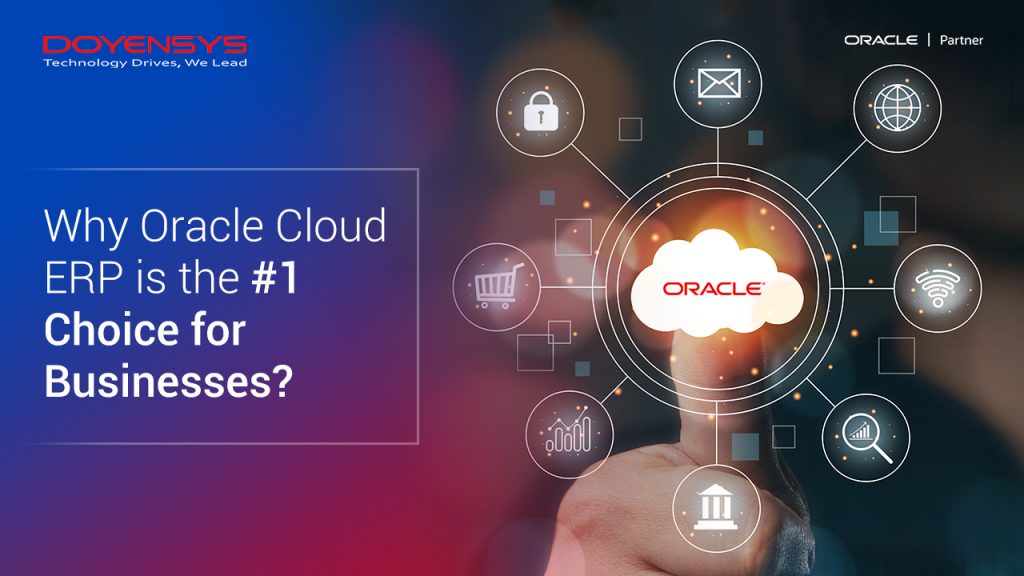Many firms rely on enterprise resource planning (ERP) systems to handle their accounting, procurement procedures, projects, and other business-wide activities. ERP system deployments have frequently been complex, expensive, and time-consuming for many IT teams, possibly necessitating considerable hardware or infrastructure investments.
ERP mindset is changing due to the introduction of cloud computing and software-as-a-service (SaaS) deployments. Businesses can streamline their technological requirements and more rapidly realize a return on investment by moving ERP to the cloud.
 Why is Cloud ERP the New Buzzword?
Why is Cloud ERP the New Buzzword?
Businesses that use cloud-based ERP deployments get lower support expenses and no maintenance or upgrades needed by the IT personnel. ERP suites hosted in the cloud are established products with many of the same features and functionalities as their on-premise counterparts.
The cloud deployment paradigm also simplifies incorporating other important technologies like mobility, decision support systems, collaboration, and social platforms. Using a cloud-based ERP suite nowadays means neither IT nor the company has to settle with inadequate or feature-lacking infrastructure or applications.
Modern ERP cloud-based software allows real-time decision making, an important activity in today’s fast-paced corporate environment, with a consumer-like user experience, inbuilt collaborative features, and in-context analytics. Modern cloud platforms are secure, dependable, and agile, enabling businesses to pursue expansion prospects confidently.
Modern ERP cloud solutions streamline, standardize, and automate business procedures, enabling enterprises to seize growth possibilities fully. A contemporary ERP cloud allows employees to interact, analyze, and operate on the go, boosting productivity and drawing top talent.
The final benefit of a modern ERP cloud is that it lowers costs and makes better use of finite IT resources, freeing them up to promote innovation. An excellent illustration of an integrated set of software that provides businesses with the functionality, analytics, and teamwork tools they require to operate is Oracle ERP Cloud.
How is Oracle Cloud ERP any Different?
The Oracle Cloud architecture, on which Oracle ERP Cloud is based, offers all of the critical features that organizations require in a cloud platform, including industry-leading high performance and scalability, unmatched reliability, and a sharp focus on security.
It integrates with popular programs like Microsoft Excel, uses in-context analytics to power decision making, gives users access to dashboards they can use to monitor and view their most pressing concerns, and makes it simple for users to collaborate within the applications to finish tasks more quickly.
Oracle Cloud is the only cloud that delivers an optimized, layered security framework at every level of the technology stack, harnessing Oracle’s large portfolio of data security and encryption products along with tried-and-true process controls at the application, infrastructure, and systems hardware layer. In contrast to other clouds that only offer security services in one or two layers.
Oracle’s underlying infrastructure and security components are sometimes absent from today’s cloud solution vendors’ offerings, which is a crucial consideration when assessing an ERP cloud service.
Not just the deployment and applications are made to be simple to use. Oracle ERP Cloud is a subscription solution that makes it simple to forecast and comprehend expenditures & enables businesses to convert costs from a capital investment to an operational expense.
Oracle ERP Cloud offers security and compliance in a recent user experience, built to scale naturally and evolve with your business. To streamline their IT infrastructure and accelerate the rollout of new features and greater security, more CFOs are choosing Oracle ERP Cloud as their ERP solution.
This software, also known as Oracle Fusion, is a complete suite of cloud applications for finance, project management, and other crucial company functions. A SaaS application’s adaptable design enables the inclusion of innovative features and improvements while retaining security.
What Benefits does Oracle Cloud ERP bring to Organizations?
By switching to Oracle Cloud ERP, businesses can free up time, money, and resources that can be used elsewhere. In migrating to Oracle Cloud ERP, Nucleus has recognized four important advantages: lower costs, better data access and sharing, better data-driven decision making, and higher user productivity.
These advantages give businesses the chance to increase productivity and support decision-making.
1. Reduced Costs
When switching to Oracle’s cloud offering, an organization can eliminate on-premises hardware and cut back on, reallocate, or eliminate IT resources. It ultimately lowers operational costs dramatically.
Organizations no longer need to manage system updates or maintain hardware and equipment with a cloud solution. Less administrative work is required as a result of this contraction, resulting in greater cost savings.
After switching from an on-premises to a cloud ERP system, customers of all company sizes reported that the suite played a crucial role in considerably lowering IT expenditures. Reduced IT maintenance, lower costs, and the release of labor resources were all part of the savings.
2. Enhanced Information Sharing & Data Access
By dismantling databases and silos, Oracle Cloud ERP enables cross-departmental insight into customer data. The result of improved departmental coordination and customer-specific experiences is increased visibility. Cross-departmental reporting is yet another outstanding feature!
Companies of various sizes have saved time and effort on reporting because of the suite’s reporting and analytics dashboards, which are Oracle Analytics powers.
3. Increased User Productivity
The globe as we know it has changed because of the recent pandemic. Organizations have had to migrate significantly to the internet and web-based functionalities to communicate and function. A working internet connection is required for Oracle’s cloud solution. The platform is the best technology for working remotely and is accessible to users worldwide.
They can use their PC or mobile device to access all company data. With many businesses allowing employees to work remotely, this is a huge perk. Oracle Cloud ERP saves time-consuming processes for generating reports and improves accessibility. No internal maintenance, security, or updates are required either!
4. Better Data-Driven Decision Making
Oracle Cloud ERP reduces the need for expensive training and specialized personnel costs by managing and integrating data for ad-hoc and custom reporting through simple-to-use applications. Customers who have access to unified data can produce more complex reports and make more informed data-driven decisions to affect company improvements.
Oracle’s ongoing investments in new features and infrastructure improvements help customers get the most out of their Cloud ERP deployments over the long term.
Transition your Business to Oracle Cloud ERP:
Oracle ERP Cloud creates a powerful, cohesive suite of modern business applications by delivering best-in-class functionality with integrated analytics, mobile accessibility, and collaboration built into its services. The Oracle ERP Cloud’s modular design lets customers gradually upgrade their ERP solutions by implementing only the required features.
Many industries & businesses of various sizes have embraced Oracle ERP Cloud. If you are searching for a streamlined & modern solution, get started with your Oracle ERP Cloud with Doyensys!

